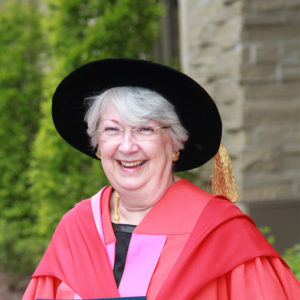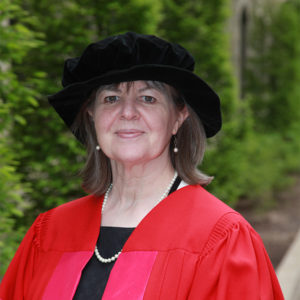Jacqueline R. Matheson
Domine Vice-Cancellari; praesento vobis Iacobam Matheson, ut admittatur ad gradum Doctoris in Jure Civili (honoris causa).
 Before the original King’s College burned in Windsor, Nova Scotia 97 years ago, all its graduands took their degrees on a dais flanked by marble busts of Demosthenes and Cicero, respective heroes of the ancient Athenian and of the ancient Roman lawcourts.[1] The presence of this duo was not meant to bracket each and every graduate into a legal career, though the College has nurtured and has honoured more than its fair share of legal minds through the centuries. The intent was rather to link the cultivation of intellect and soul that took place inside the University with the strong impulse to liberal service of community, by various career paths, that was, and is, the choice fruit of such cultivation. Demosthenes and Cicero made their names in the courts, but they are remembered for their eloquent philosophical, historical, and political analyses, as well as for the practical contributions they made to their societies. In adding the Honourable Jacqueline Matheson to our list of graduates today, we recognize the exemplary and groundbreaking career of a lawyer and judge sustained by the deepest devotion to the good of her island community, as well as to the national and international societies to which it belongs.
Before the original King’s College burned in Windsor, Nova Scotia 97 years ago, all its graduands took their degrees on a dais flanked by marble busts of Demosthenes and Cicero, respective heroes of the ancient Athenian and of the ancient Roman lawcourts.[1] The presence of this duo was not meant to bracket each and every graduate into a legal career, though the College has nurtured and has honoured more than its fair share of legal minds through the centuries. The intent was rather to link the cultivation of intellect and soul that took place inside the University with the strong impulse to liberal service of community, by various career paths, that was, and is, the choice fruit of such cultivation. Demosthenes and Cicero made their names in the courts, but they are remembered for their eloquent philosophical, historical, and political analyses, as well as for the practical contributions they made to their societies. In adding the Honourable Jacqueline Matheson to our list of graduates today, we recognize the exemplary and groundbreaking career of a lawyer and judge sustained by the deepest devotion to the good of her island community, as well as to the national and international societies to which it belongs.
A native of Prince Edward Island, Jacqueline Matheson obtained bachelor’s and master’s degrees in Business and Public Administration in New Brunswick and at Dalhousie University, where she also received her Bachelor of Laws in 1977. After scarcely 10 years at the bar in PEI, having practiced privately and with the Federal Department of Justice, she was appointed to that province’s Supreme Court, Trial division in 1988. Sixteen years later, she became Chief Justice of the same court. Justice Matheson made history as the first woman to hold either of these crucial offices, which over 29 years saw her presiding at trials in all aspects of criminal and civil legality and rendering several landmark decisions. Her long, distinguished record of sound and resilient judgement has led one colleague to coin an aphorism: “For Jackie, if it didn’t make good sense, it couldn’t make good law.” In the same spirit, Jacqueline Matheson has long striven to ballast learned jurisprudence with improved education for judges on social issues such as sexual violence, gender and racial equity, and indigenous justice. With no less vigour, she has advocated for improved access to judicial process and for systematic reform wherever it is needed. In both endeavours, Justice Matheson has toiled at the local, national and global levels, as attested by her long service to the International Association of Women Judges, a group of over 4,000 jurists with special interests in developing countries. She has lent her wisdom to a variety of interests outside the law too, serving for a decade on Dalhousie’s Board of Governors, to cite just once contribution to the cause of higher education. And she is more than familiar with King’s as well, since both of her daughters, Katie and Elizabeth, are alumnae of the College.
In January of this year, Justice Matheson began to limit her time on the bench. A lifelong horticulturalist with a renowned green thumb, she is perhaps making more time for the garden. If so, she no doubt has that ancient jurist Cicero in mind, who set his philosophical dialogue de Legibus, “On Laws,” in a garden, understanding that nature wisely cultivated is like a society soundly legislated: prosperous and fruitful. Mr. Vice-Chancellor, our King’s motto, “Deo, Legi, Gregi” makes devotion “to Law” its centerpiece. Is it not fitting that we honour a woman who has made that devotion her life’s centre? I therefore ask you, in the name of King’s College, to bestow upon the Honourable Jacqueline R. Matheson the degree of Doctor of Civil Laws (honoris causa).
[1] Cf. F.W. Vroom, King’s College: A Chronicle: 1789-1939 (Halifax: Imperial, 1941), 80 n1. These busts are currently on display in the College Library in Halifax.
Mary Lu Roffey Redden
Domine Vice-Cancellari; praesento vobis Mariam Ludovicam Redden ut admittatur ad gradum Doctoris in Jure Civili (honoris causa).
 At King’s we claim to understand the virtue of the humanities: in a world both obsessed with technocratic concepts of freedom and encumbered by utilitarian ways of thinking, they liberate the student’s mind. Studying fictions, histories, and philosophies encourage her to range freely through the thoughts and experiences of other peoples, places, and times, and so come to know herself and to understand her present context more thoroughly. Such theoretical grounding is the best preparation for practical citizenship; for making meaningful individual contributions to community and for changing the status quo when the common good demands it. Those trained in liberal studies must inevitably come to grips, however, with the fact that so many are prevented by lack of opportunity or mischance from accessing the benefits of humanities education. A lifetime of humane study and teaching has fueled Mary Lu Redden’s advocacy for barrier-free humanities in Halifax, a labour of love that merits and demands our recognition today.
At King’s we claim to understand the virtue of the humanities: in a world both obsessed with technocratic concepts of freedom and encumbered by utilitarian ways of thinking, they liberate the student’s mind. Studying fictions, histories, and philosophies encourage her to range freely through the thoughts and experiences of other peoples, places, and times, and so come to know herself and to understand her present context more thoroughly. Such theoretical grounding is the best preparation for practical citizenship; for making meaningful individual contributions to community and for changing the status quo when the common good demands it. Those trained in liberal studies must inevitably come to grips, however, with the fact that so many are prevented by lack of opportunity or mischance from accessing the benefits of humanities education. A lifetime of humane study and teaching has fueled Mary Lu Redden’s advocacy for barrier-free humanities in Halifax, a labour of love that merits and demands our recognition today.
Born into a family with limited background in post-secondary education, Ms. Redden was a studious youth who headed to Huron University College in London Ontario after high school. There she was attracted to the supremely humane (and, by common judgement, equally useless) subjects of classics and philosophy. Academic excellence led her to graduate work in Religious Studies at McMaster University in Hamilton, where she took an MA and nearly completed a PhD, her doctoral studies interrupted by the demands of family. As soon as time and circumstances allowed, however, she began teaching courses in religion, writing, literature, and communications for colleges and organizations in Ontario and Nova Scotia, where she eventually relocated with her two children and her husband Gordon. In this city in 2006, she began her Directorship of the Halifax Humanities Society, an initiative of King’s Chaplain Gary Thorne and late Professor Angus Johnston that provides university level humanities education to adults on low incomes. Since then, with a curriculum based on the King’s Foundation Year and in partnership with professors from King’s, Dalhousie, and other Nova Scotian universities, the Society’s flagship course has fostered liberal studies among dozens of students otherwise excluded from them. Mary Lu Redden has presided over the process as practical impresario and intellectual midwife, recruiting participants, raising funds, arranging transportation and creating the safe spaces needed to explore great texts from the Epic of Gilgamesh to Alice Munro. And, like any true devotee of the humanities, Mary Lu has been not only a leader, but also a participant in the communal learning that takes every student and every teacher beyond ourselves, moving us to more universal perspectives on the human challenge.
Those who correspond by email with Ms. Redden will have noted a favourite signature tag borrowed from the Roman poet Virgil: dux femina facti: “A woman was author of the achievement.”[1] Halifax Humanities and FYP students alike know its original reference to the magnificent, but doomed Dido, Queen of Carthage. Yet in applying the epithet to Mary Lu, we evoke not tragedy, but her own splendid achievement and the hopeful spirit of humane learning that has inspired it. Such learning transforms the sorrow of human limitation into the joy of knowing, and of being able to imagine, better things.
Mr. Vice Chancellor, for her profound contribution to the life of the Humanities in Halifax, I ask you, in the name of King’s College, to bestow upon Mary Lu Redden the degree of Doctor of Civil Law (honoris causa).